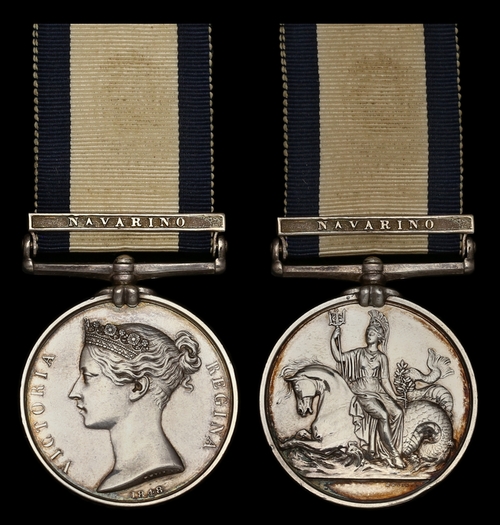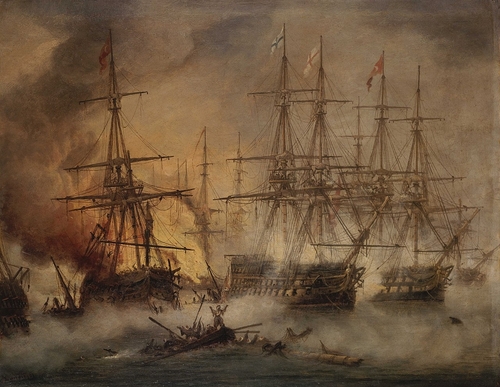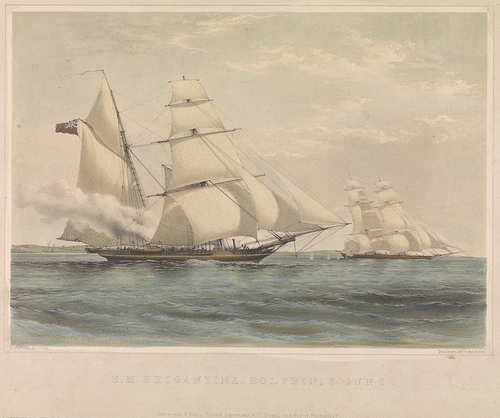Auction: 25002 - Orders, Decorations and Medals
Lot: 3
The Naval General Service Medal awarded to Gunroom Steward J. Windatt, Royal Navy, who after seeing action at the Battle of Navarino deserted the Navy for a twelve year period, later rejoining to serve at the Battle of Obligado and in the Baltic, there falling victim to the cholera outbreak yet served until his discharge at the age of 54
Naval General Service 1793-1840, 1 clasp, Navarino (Jeremiah Windatt.), slight edge wear, otherwise good very fine
Jeremiah Windatt was born in 1802 at Kingsand, Cornwall and volunteered to join the Royal Navy in 1824 at the age of twenty-two. Serving first for but one month with Britannia, he joined the third rate 74-gun H.M.S. Genoa as a Landsman on 30 October 1824 at Plymouth. Genoa had begun life as Brilliant with the French Navy, but was captured by the British at the fall of Genoa while still under construction. She was completed and launched by the British the following year in April 1815. Windatt first served aboard her at Plymouth, where he was married to Mary Ann Hoskins at Stoke Damerel on 11 April 1826, and later sailed with Genoa to Lisbon where she was listed as the flagship. Under the command of Captain Walter Bathurst she was brought into the Mediterranean Fleet, with whom she sailed for the Greek Archipelago in August 1827 to fight in the Battle of Navarino.
The Battle of Navarino was fought on 20 October 1827 during the Greek War of Independence (1821-29). A combined Turkish and Egyptian armada under Tahir Pasha was destroyed by Admiral Sir Edward Codrington's allied British, French, and Russian naval force at the port of Navarino (now Pylos), in southern Greece. The Allied ships were better armed than their Egyptian and Turkish enemies and their crews better trained, resulting in a quick victory despite being vastly outnumbered.
While not a single European vessel was sunk, Genoa sustained the highest number of British casualties during the battle after taking an active role in support of the flagship H.M.S. Asia. She suffered 33 men wounded and 26 killed, a number which included her Captain who succumbed to his wounds after the battle. The losses of the Allied forces amounted to 661 killed or wounded, while the Turkish armada lost 55 of their ships and about 4,000 men. This decisive defeat led to the Turks' evacuation of Greece and the creation of the independent Kingdom of Greece a few years later in 1832.
After the battle, Genoa sailed for Plymouth where Windatt was paid off on 21 January 1828, and does not appear on the books of the Royal Navy again until 31 January 1832. It is not clear what his whereabouts were in this four-year period before being mustered aboard the 120-gun first rate H.M.S. Caledonia. It is noted that on 11 February she assisted a merchant vessel off the coast of Plymouth, and then on 24 May she departed for Lisbon. In June, Portugal asked the Royal Navy to leave the Tagus River, though Caledonia and a number of other ships remained in the area to protect British interests. She stayed off the Portuguese coast until returning to Plymouth on 28 April 1833. Windatt was paid off the following month, and after the short break joined the fifth rate frigate Endymion on 5 August 1833 as a 'Young Gentleman's Steward', a rank which likely required him to wait upon the midshipmen.
After little over a month with Endymion, Windatt deserted. He likely decided to 'run' whilst she was docked at Milford Haven on 24 September. The reasons behind his desertion are unknown, but while absent from the Royal Navy he was married a second time to a Miss Mary Ann Bendall at St. James' Church, Bath on 28 May 1834. The couple's daughter Sarah Ann Windatt was born the following year. Windatt would be a deserter for a total of twelve years, and did not rejoin the service until reenlisting on 22 February 1845. He then joined the 3-gun brigantine H.M.S. Dolphin as a 'Commander's Steward', with his service record curiously listing his conduct as 'good' alongside being also marked with an 'R' for deserting.
Windatt served with Dolphin on 20 November 1845 at the Battle of Vuelta de Obligado on the Parana River, north of Buenos Aires. The battle was fought between an Allied British and French fleet against the Argentine Confederation under Don Juan Manuel de Rosas, who had laid siege to Montevideo, Uruguay and blocked surrounding ports to foreign trade thus disrupting Anglo-French interests there. The Allied forces achieved a pyrrhic victory after a hard-fought battle, during which Dolphin suffered heavy fire as for a short time she was the most advanced and exposed Allied ship. She sustained five men killed and 14 wounded, the highest number of any British vessel present. Windatt had survived another fierce naval engagement.
Following his service with Dolphin, after a brief period ashore Windatt joined paddle sloop Stromboli as a Gunroom Steward for a little under a year before being paid off on 10 November 1847. He next rejoined Caledonia for just 47 days before being paid off, and was next mustered aboard depot ship H.M.S. Agincourt on 30 January 1848. On the books he appears in three different ranks: Gunroom Steward, Captain's Steward and finally Able Seaman. From Agincourt Windatt joined St. George on 31 August 1850 as a Commander's Steward.
He was paid off St. George on 3 December 1853 and next joined 120-gun first rate screw warship Royal George on 4 February, now at the relatively advanced age of 51. She joined the fleet at Portsmouth and departed for the Baltic on 11 March 1854, with war being officially declared on 4 April. She shared in the prize money for the capture of Russian brig Patrioten on 15 April, and on 19 May suffered minor damage in a nighttime collision with fellow British vessel Caesar. On 13 June, the British ships were joined by the French fleet and together they moved towards Cronstadt. After anchoring off shore for a couple of weeks, the fleet retreated and no battle was fought. However in early July they suffered a terrible cholera outbreak, thought to be a result of contaminated water, and at the time the fleet was blamed for bringing the outbreak to England. Royal George was not spared, and records 44 cases of cholera on board. Windatt must have counted as one of these, as he was invalided to England on 21 July on board Dauntless, which reportedly had 71 cases.
Despite suffering from cholera, this was not to be the end for the old sailor and Windatt was again mustered for service on 8 January 1855 as a Gunroom Steward aboard H.M.S. Conflict. He served with her until 21 February and, after a break, joined Sans Pareil on 28 January 1856 with whom he was present during the Fleet Review at Spithead on 23 April. Windatt finally retired upon leaving her on 13 October 1856, having served only for sixteen years in total despite having entered the Royal Navy in 1824. He was further awarded the Baltic Medal, which was sent to him in Plymouth on 26 March 1857. Windatt died at the age of 84 in Liverpool in 1886 and was buried in St. James' Cemetery; sold together with binder of copied research and information.
Subject to 20% VAT on Buyer’s Premium. For more information please view Terms and Conditions for Buyers.
Sold for
£1,000
Starting price
£1000









